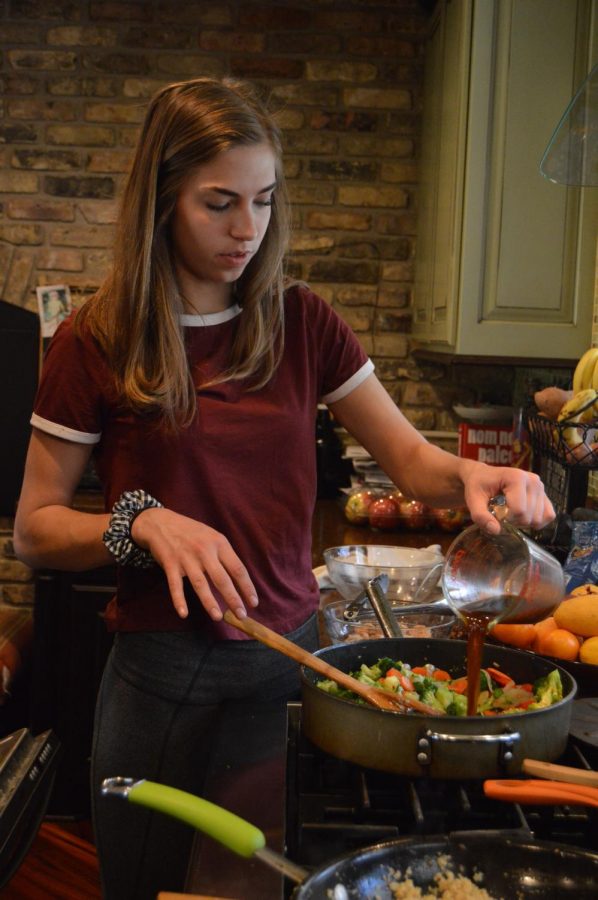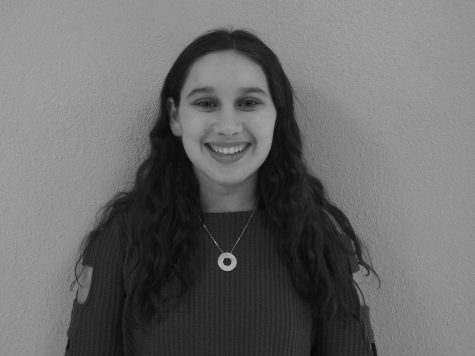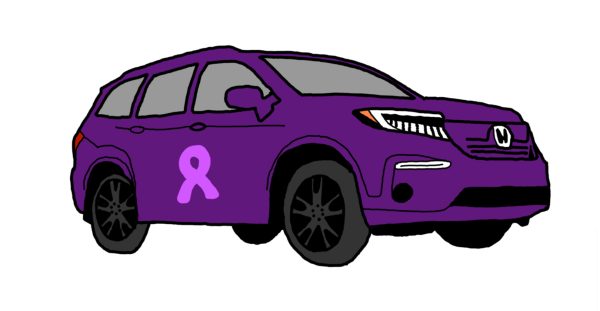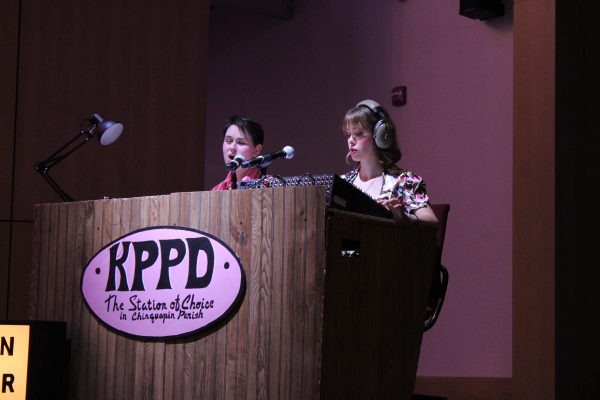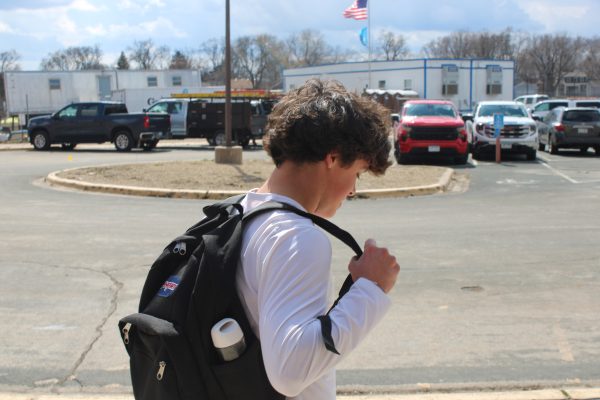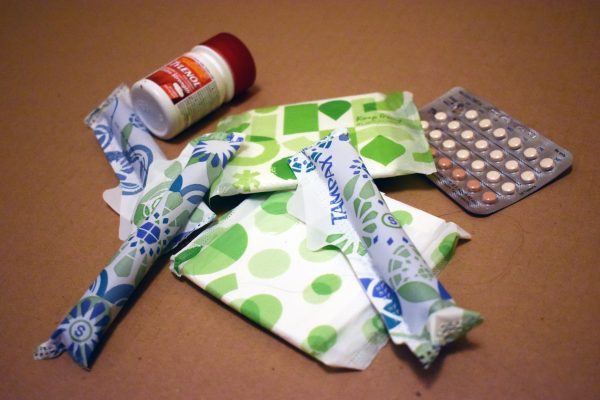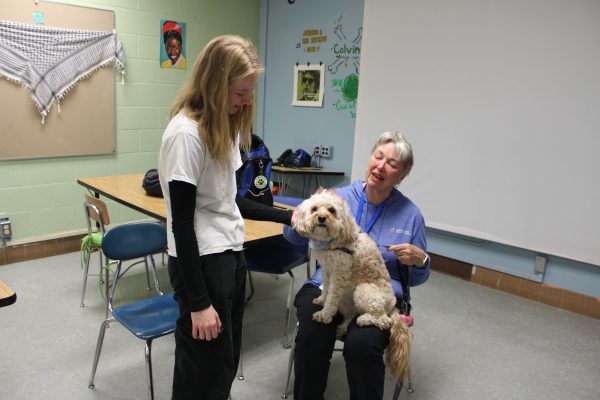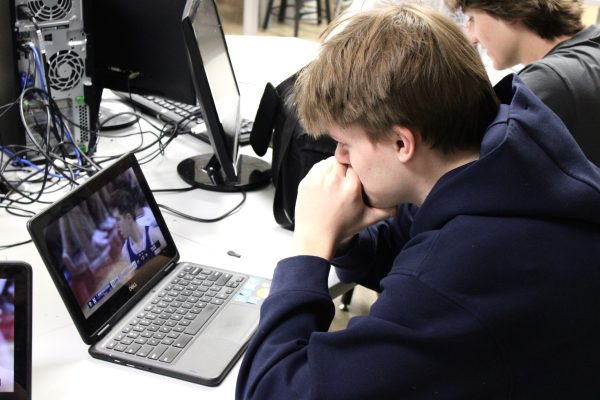New diets, eating habits grow in popularity with mixed results
Whole30, cleanse fads emerge
Senior Hannah Wolk prepares a cauliflower shrimp stir fry May 2. Wolk and her family previously participated in the Whole30 challenge, during which participants eliminate sugar, alcohol, grains, legumes, soy, and dairy from their diets for 30 days. Although they no longer keep a strict paleo diet, Wolk and her family still eat many paleo foods.
May 5, 2018
As senior Hannah Wolk reflects on her experience participating in the Whole30 challenge she said she felt electrified after the lifestyle change.
“I definitely felt a lot healthier and not very bloated at all,” Wolk said. “I would normally feel bloated after a big meal or eating a lot of sugar, and I had a lot more energy too.”
According to Wolk, the Whole30 Program restricts participants’ diets for a 30-day period.
“I did 30 days of strictly Whole30 and paleo eating. I did it with my parents, so it was a lot easier because we cooked together and came up with recipes,” Wolk said.
According to registered dietitian nutritionist Lynda Enright, shifting or eliminating foods in one’s diet provides many benefits.
“I help people to use food to heal their bodies to eliminate the symptoms they’ve been living with inflammatory conditions, autoimmune disease, weight management, so I hope to use food for joy,” Enright said.
Enright said she believes temporary diets are less effective than complete lifestyle changes.
“In our culture we have this idea that we are going to do something for a little while and then we’re going to go back to what we were doing that maybe got us in a position that didn’t work very well for us,” Enright said. “To me a diet is what you are going to be eating forever.”
Wolk said the positive effects of the Whole30 challenge inspired her to continue a paleo lifestyle, which consists of vegetables, fruits and poultry.
“After the 30 days, I stopped eating strictly paleo, but we still eat a lot of paleo foods,” Wolk said. “You’re not supposed to eat anything with added sugar, corn syrup or canola oil.”
According to Enright, diets are personal and their health impacts vary from one person to the next.
“Some people do food sensitivity testing, so we create a very specific diet for them so they find out what their reactions are until they heal. For some people I do standard elimination diets if they have autoimmune issues going on,” Enright said.
According to junior Alexis Machoka, she attempted a 21-day water-only cleanse, however, she does not suggest the potentially unhealthy diet.
“I wanted to do it because I felt like I needed to cleanse my body and it just felt like a good idea at the time,” Machoka said. “I could not sustain it so I did not finish it.”
Enright said she believes the temporary nature of juice and water cleanses decreases their potential to transform a lifestyle.
“I do food cleanses where people really clean up their diet using food but not simply juicing. I don’t think that is a super healthy option for most people,” Enright said.
Machoka said the cleanse attempt taught her how to effectively live a healthy lifestyle.
“It didn’t help me feel any better at all, it just made me feel more tired and cranky,” Machoka said. “I think when it comes to health, just eating healthy and exercising is the key.”

Freshman Steven Applequist said he believes cleanses are an alternative to typical weight loss diets, yet there remain many flaws with the process.
“They’re a good idea in a general concept. They can be improved in ways too,” Applequist said.
Wolk said in addition to the healthy aspect of the program, her Whole30 diet was inexpensive.
“I saved a lot of money because you can’t eat out as much because a lot of the food that we eat out has lots of added sugar, or is made with canola oil, so I saved money for sure,” Wolk said.
Applequist said he feels maintaining a well-balanced diet is important for a healthy lifestyle.
“I think dieting is a good thing as long as you’re doing it healthily. Instead of starving yourself, eat more things that consist of more waters and whatnot instead of fats,” Applequist said.
Enright said she advises teenagers to discover food’s role in their own lifestyle as they continue to grow older.
“We live in a really bad environment around food and health. We really do all have to make conscious choices everyday to promote good health,” Enright said.
Wolk said the support she recieved during this lifestyle change aided her in completing the Whole30 challenge.
“We made an Instagram food account where we post what we cook,” Wolk said. “It’s been a cool experience to bond with my parents over healthy food.”



